Downloaded from www.mymenopausecentre.com
Direct URL: https://www.mymenopausecentre.com/symptoms/weight-gain/
Menopause and weight gain
Weight gain is common, with complex causes. It can be linked directly to the menopause or can be caused by the effects of other symptoms, such as fatigue, leading to less activity.
Explore
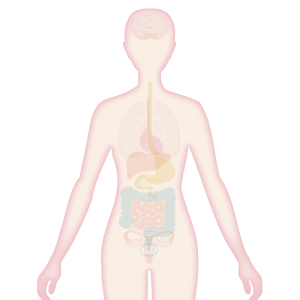
Book an appointment
The highly experienced doctors and nurses in our menopause clinic are here to help you. Appointments from £190.
Book An AppointmentIf you would like to learn more about the impact of your symptom(s) complete our free online menopause questionnaire here.
Weight gain is one of the most common issues that we are asked about in relation to menopause. Lots of women express their frustration that they have gained weight, can’t seem to lose it, and that it gets harder and harder to manage as they get older. Weight gain is one of the many factors that can affect self-esteem in the menopause. Some weight gain is linked to menopause hormones and some isn’t. But there’s good news – it’s possible to lose weight in the menopause.
What causes weight gain in the menopause?
Weight gain is complicated, the reasons for weight gain will be different for every woman, and we probably don’t understand all the reasons for it. Many of the reasons for weight gain you’ll see below are often interlinked. We hope this summary will help you to understand the changes your body goes through as you get older and help you take back control.
- Many women need fewer calories as they go through the menopause and beyond. You can carry on eating exactly the same way as you have always done, but your weight will slowly increase
- We gradually lose muscle mass as we gain years. Muscle burns calories, so as it disappears, our basal metabolic rate drops (this is the amount of energy or number of calories that your body needs to carry out its basic function)
- On average, women gain around 0.5kg a year from their mid-40s[1]
- Low oestrogen levels result in a redistribution of fat from the thighs to round your middle – so that even if your weight stays the same, your body shape may change.
- You may experience changes in appetite as a result of falling oestrogen levels
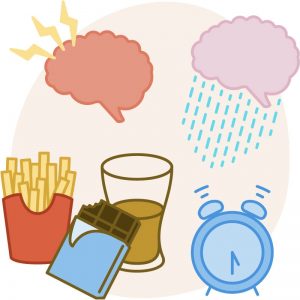 You may be feeling tired, stressed, anxious, and have low mood in the menopause. It’s the easiest thing in the world to comfort eat when you feel like this, and it’s just as easy for calories to increase without us noticing. Release of the stress hormone cortisol can also result in fat settling around your middle.
You may be feeling tired, stressed, anxious, and have low mood in the menopause. It’s the easiest thing in the world to comfort eat when you feel like this, and it’s just as easy for calories to increase without us noticing. Release of the stress hormone cortisol can also result in fat settling around your middle.
Tiredness, stress, and low mood can also decrease your motivation to exercise, which leads to weight gain. Many of us are juggling relationships, work, and our symptoms and we forget to take time to look after ourselves.
It’s true that, for many, whether you gain weight and how you gain it can be affected by your genes. It’s also true that some women will find it harder to lose weight, but it is possible for most of us – think tiny changes for long-term gains.
How many women typically experience weight gain, at what age and for how long?
Weight gain in the menopause is common. In a survey conducted by the British Menopause Society, just under half of the women interviewed said they had gained weight in the menopause[2].
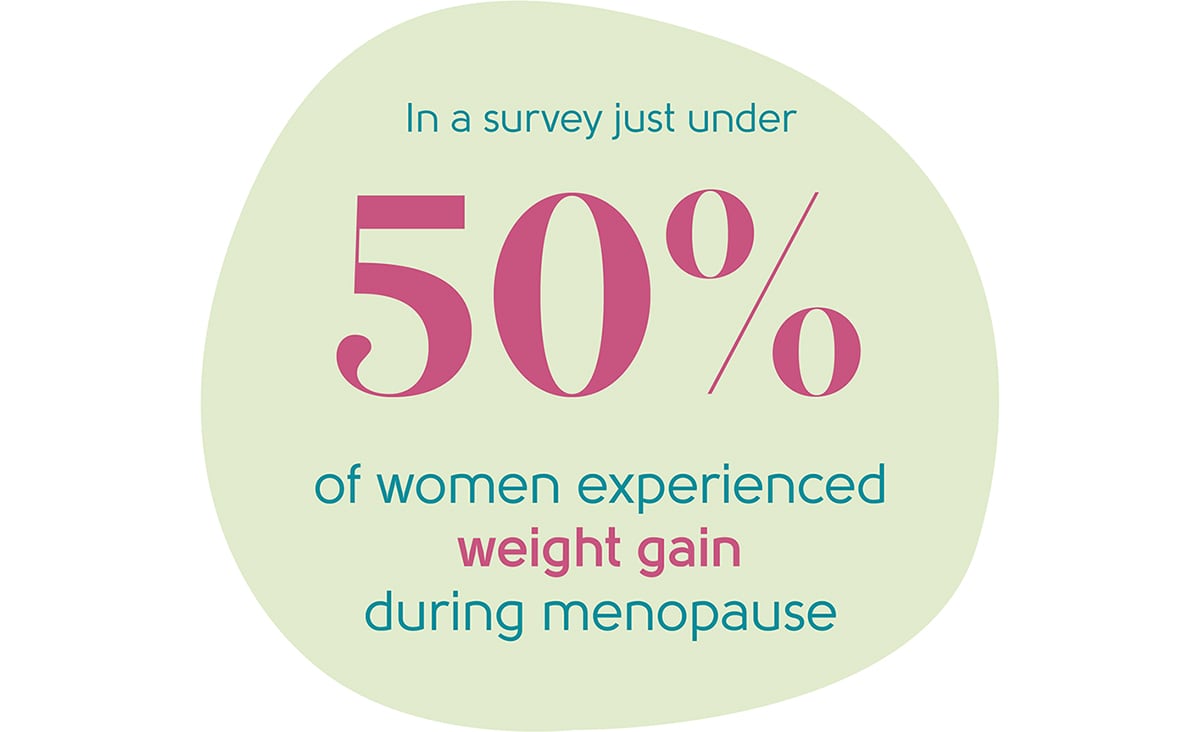
Is weight gain linked to any particular stage of the menopause?
Weight gain can occur at any stage of the menopause. Oestrogen levels swing up and down in the perimenopause and stay low in the menopause and beyond, so if your weight gain is linked to oestrogen, it can happen at any stage of the transition.
What can I do to manage my weight?
This is the million-pound question! Eating less and exercising more is easy to say and harder to do, but there are many ways to go about it.
Exercise
There’s lots of evidence to show that moving and exercising more is the key to losing weight in the menopause[3]. If you’re not currently exercising, just start with small changes, like putting on a pair of trainers or comfortable shoes and walking for five or ten minutes. Take one day at a time and build even the smallest amount of extra exercise into your day. You don’t have to start with a marathon.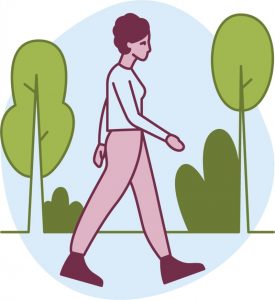
Any exercise that helps build muscle mass is good – yoga, pilates, and weight training can all help. Yoga has the added benefit of soothing the mind and reducing stress. Weight-bearing exercise, such as brisk walking or running, can help prevent osteoporosis.
Diet
A perfect menopause weight loss diet doesn’t exist. What works (and is sustainable) will differ from person to person, but there are general principles that apply to everybody. The NHS is a great starting point.
Try your best to avoid sugary foods that will cause swings in blood sugar and will not fill you up. Instead, eat more vegetables, slow-release carbohydrates, and protein as they will fill you up and help maintain a steady blood sugar level.
Everyone is different in how they react to diets – and some of this is down to genetics and is beyond our control. Some women do better with small meals often, others with three sensible meals a day and no snacking. So it’s important to find what works for you.
It’s a good idea to learn about calorie contents and become familiar with the number of calories in different foods, and an estimate of how many calories you need in a day. There are plenty of apps that can help you do this.
Keep track of what you’re eating and try to avoid ‘mindlessly snacking’ if you don’t need to. Staying away from, or at least limiting, the empty calories of alcohol and sugary drinks will help you feel better.
Many women say that they drink more to deal with stress and anxiety and to help them to sleep. Alcohol contains many calories which will be quickly converted to extra fat. It’s also a mood depressant. If you’re using alcohol to sleep, have a look at our sleep information page to find other ways to help you sleep.
A dietician or nutritionist can help find the right diet for you to control weight gain. You can find out more about our nutritionist partner here.
Hormone Replacement Therapy (HRT)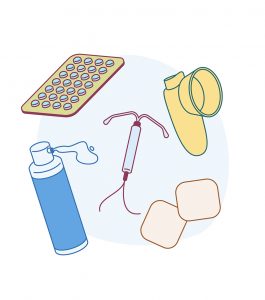
For some women, HRT may help prevent some of the changes that result in weight gain in the menopause. There’s no evidence that HRT itself causes weight gain – a commonly held belief.
HRT can also increase your sense of wellbeing by managing your menopause symptoms. If you feel better, you will be less likely to comfort eat and are more likely to be more active.
What next?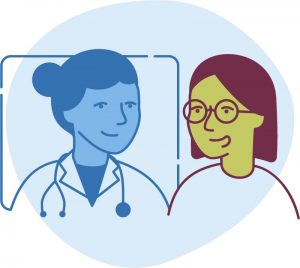
If you’re concerned about weight gain, see your GP. If you would like to discuss your symptoms in the context of the menopause, book an appointment with our menopause clinic.
If you think you may be experiencing symptoms of the menopause transition, you can learn more with our symptom checker or by taking our Menopause Questionnaire.
You can also find more information about the menopause transition at the British Menopause Society and the National Institute for Health and Care Excellence.
Authored by:
Dr Clare Spencer
Registered menopause specialist, GP and co-founder; see Dr Clare in person at The Spire Hospital, Leeds or online
Last updated:
07/04/2021
Book an appointment
The highly experienced doctors and nurses in our menopause clinic are here to help you. Appointments from £190.
Book An AppointmentLearn more
Join the pause. community
We’ve created pause. as a space for women to come together and share stories about their menopause experience, ask questions, and to find support and inspiration. We'll also share the latest news and updates on the menopause from our experts.
Want to be the first to hear our latest news? Join our pause. community today.
Share your email to receive the latest news, updates and information on new products and treatments from My Menopause Centre and our pause. community. You can unsubscribe at any time.
We're committed to protecting and respecting your privacy - see our Privacy Policy and Terms and Conditions

Book a consultation
Whether you want to discuss your symptoms, create a treatment plan that's right for you, understand some test results or have a check-up, the highly experienced doctors and nurses in our menopause clinic are here to help you.
Book nowReferences
-
Source: Brown WJ, Williams L, Ford JH, Ball K, Dobson AJ. Identifying the energy gap: magnitude and determinants of 5-year weight gain in midage women. Obes Res. 2005 Aug;13(8):1431-41.
-
Source: Currie H, Moger SJ. Menopause – Understanding the impact on women and their partners. Post Reprod Health. 2019 Dec;25(4):183-190.
-
Source: Van Gemert WA, Schuit AJ, van der Palen J, et al. Effect of weight loss, with or without exercise, on body composition and sex hormones in postmenopausal women: the SHAPE-2 trial. Breast Cancer Res. 2015;17(1):120.
Contact My Menopause Centre
- General enquiries: hello@mymenopausecentre.com
- Book appointments online: Log into your account and go to 'My appointments'
- Book appointments by phone: 0333 444 1067
- Website: https://www.mymenopausecentre.com


















